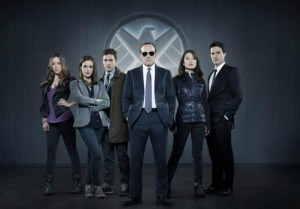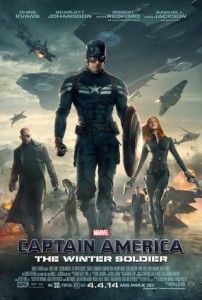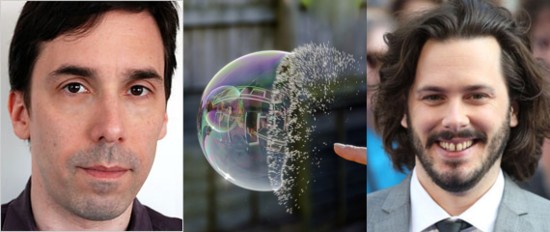The journalist, known for his work at Entertainment Weekly, the New York Times, and other periodicals, has a column up over at Grantland titled, “Are We at Peak Superhero?” where he acts as the doomsayer for the comic book movie/TV genre.
You might remember that three years ago, Harris wrote a similar manifesto for GQ called “The Day The Movies Died,” where he bemoaned the rise of “brand movies” and how they are forcing quality, original films off the market. I provided a counterpoint here, where I shot holes in his rather ill though-out argument (which essentially consisted of “I don’t like these sequels, remakes, and adaptations here. I prefer those sequel, remakes, and adaptations over there”). His argument here isn’t that much better.
 Harris theorizes that the comic book media bubble is about to burst. It’s the same theory Cracked’s J.F. Sargent put out last year, although he had more evidence. For Harris, the bubble bursting comes down to one thing: the failing ratings and poor reviews that Agents of S.H.I.E.L.D. received, which according to Harris was due to poor writing, which was due to the show trying to be the slave to too many masters (Men, women, kids, comic fans, comic film fans, Lost fans, etc), specifically the small number of fans who require inter-connectivity in their comic book media entertainment. Harris believes that this final point is what is most harmful to the comic book movies and TV shows, as it exposes how the individual art suffers as it is more concerned with becoming part of a larger whole.
Harris theorizes that the comic book media bubble is about to burst. It’s the same theory Cracked’s J.F. Sargent put out last year, although he had more evidence. For Harris, the bubble bursting comes down to one thing: the failing ratings and poor reviews that Agents of S.H.I.E.L.D. received, which according to Harris was due to poor writing, which was due to the show trying to be the slave to too many masters (Men, women, kids, comic fans, comic film fans, Lost fans, etc), specifically the small number of fans who require inter-connectivity in their comic book media entertainment. Harris believes that this final point is what is most harmful to the comic book movies and TV shows, as it exposes how the individual art suffers as it is more concerned with becoming part of a larger whole.
There are a lot of flaws in this argument, starting with the fact that are many other reasons for AoS‘s lack of success. For instance, I think the fact it aired opposite NCIS and The Voice, two of the most popular shows on TV, might have played a role in the disappointing ratings as much as it’s real or perceived lack of quality.
You also have to take into consideration how hard it is for movies to translate into TV shows. For every Buffy the Vampire Slayer, M*A*S*H, or The Odd Couple, you have countless Ferris Buellers, Blue Thunders, Baby Booms, Uncle Bucks and Starmans. To think that a TV show spun off from the successful Marvel Cinematic Universe would be a great hit no matter what is unrealistic. And to think that the TV show’s success or failure would have any basis on the success or failure of the franchise is wishful thinking at best.
And even though Harris thinks the ties AoS has to the films is what brought it down, an argument could be made that it’s lack of ties could also be a reason for its lackluster performance. I made that argument here.
 But the biggest flaw in Harris argument was that Captain America: The Winter Soldier came out just as AoS‘s ratings were going into free fall. The film opened to the highest April opening in history. It has made over $254 million domestically and over $708 million world wide. That is an increase of about $80 million domestically and $400 million worldwide over the previous Cap film, Captain America: The First Avenger. If the decline of AoS was the beginning of the end of the success of comic movies, shouldn’t Winter Soldier have tanked at the box office? Or, at the very least, have a hard time matching the grosses of the first film in the series? The dip in AoS‘s ratings had no bearings on the success of Winter Soldier, even though they share the same level of inter-connectivity with the franchise as a whole. Therefore, it’s doubtful that the troubles AoS is having is any indicator of the superhero film/TV bubble will burst.
But the biggest flaw in Harris argument was that Captain America: The Winter Soldier came out just as AoS‘s ratings were going into free fall. The film opened to the highest April opening in history. It has made over $254 million domestically and over $708 million world wide. That is an increase of about $80 million domestically and $400 million worldwide over the previous Cap film, Captain America: The First Avenger. If the decline of AoS was the beginning of the end of the success of comic movies, shouldn’t Winter Soldier have tanked at the box office? Or, at the very least, have a hard time matching the grosses of the first film in the series? The dip in AoS‘s ratings had no bearings on the success of Winter Soldier, even though they share the same level of inter-connectivity with the franchise as a whole. Therefore, it’s doubtful that the troubles AoS is having is any indicator of the superhero film/TV bubble will burst.
If Harris wanted a Marvel-centric inciting event that might cause the now-legendary bubble to burst, he should have held off a week. If he waited until after the Labor Day weekend, he would have a more realistic event that might cause the end of comic book movies success as we know it.
 Edgar Wright and Marvel parting ways over Ant-Man was such a bombshell that even the fact the news was released late on a Friday before a three-day American holiday weekend was not enough to bury it. The story burned up the Internet and became conversation fodder at a number of cookouts over the three days.
Edgar Wright and Marvel parting ways over Ant-Man was such a bombshell that even the fact the news was released late on a Friday before a three-day American holiday weekend was not enough to bury it. The story burned up the Internet and became conversation fodder at a number of cookouts over the three days.
In the hours and days after the bombshell announcement, a reason for Wright’s departure has gained a foothold in the gossip press. As confirmed by sources to the Hollywood Reporter, Marvel rewrote Wright’s script for Ant-Man, a script that was in development between Wright and Marvel for eight years, without the director’s input. Presented with directing a script that was not up to his own personal standards of quality, Wright decided to walk away from the project.
If there was ever an incident that would pop the comic book film bubble, it would be this one, especially when it comes to Marvel’s dominance at the box office. Let me explain.
- It comes at an uncertain time for comic book films in general…: Sony’s Amazing Spider-Man 2, a film that was supposed to launch a number of spin-offs and sequels, became the lowest grossing Spider-Man film to date and is viewed as a disappointment (although, I’m sure there are a lot of film studios out there that would love to have a $677 million grossing disappointment on their ledger sheets). Fox has a Fantastic Four reboot in the works that has raised more ire in the fan community than excitement. Its X-Men franchise scored a big hit with Days of Future Past, but the director behind that is embroiled in a messy legal issue, and the franchise does not fare well in the hands of others. And Warners is going all in after the success of The Man of Steel and will be bring the rest of the DC Universe in to play in a big way in Batman v. Superman: Dawn of Justice, a move that is seen as both risky and desperate.
- …and Marvel in particular.: Of the four films announced on Marvel’s schedule, we had two sure bets book ended by two uncertain films.First, Guardians of the Galaxy is the least-known Marvel property brought to the screen to date, and the jokey tone of the first trailer seems like a break from the typical Marvel film, and not in a good way. On the other side, you have Captain America 3, which would have been a no-brainer hit if it wasn’t for the fact that it will be going head-to-head with Warners’ Batman V. Superman: Dawn of Justice on May 6, 2016. The only way it could win is if BVSDOJ moves. Since Marvel had the release date first, it would be a sign of weakness if Cap 3 relocates. And if they stay on the same day, it has the chance of losing quite a bit of its audience to Warners. In between, Marvel had relative sure things in The Avengers: Age of Ultron and Wright’s Ant-Man. With Wright gone, there’s another question mark.
- It shows an ungrateful Marvel: Wright has been attached to Ant-Man since 2006, way before Iron Man hit screen, way back when Marvel starting its own studio was seen as a huge risk. Wright, hot off his breakthrough film, Shaun of the Dead, added legitimacy to the burgeoning studio, and his hiring told the world Marvel was serious about doing its films right. Now that Marvel Studios has become an unstoppable juggernaut, and a big jewel in the Disney crown, they have no need of the buzz Edgar Wright’s name brought them. So, instead of continuing to try to reach a middle ground, they simply let Wright walk away.
- It shows an arrogant Marvel: If the prevailing rumors are true, the studio decided it had enough of negotiating with Wright and Joe Cornish over the Ant-Man script, decided to put it into the hands of the less skilled but more agreeable writing group, and gave it back to Wright to direct as if they were doing him a favor. Even if Wright was fresh out of film school, this would still be insulting. But Wright is an imaginative writer/director with a body of great films to his credit and a definite following of fans. This is not the first time Marvel walked away from someone they felt they couldn’t work with (see Terrence Howard, Edward Norton, and Patty Jenkins for other examples), and those worked out, but that doesn’t mean every time will be a change for the better.
- It shows a rather short-sighted Marvel: Even back in 2006 with only one film under his belt, one could tell that Wright would not be the prototypical comic book film director. And , as the years went by and Wright began to develop his trademark writing and directing style, it quickly became obvious to movie fans that his Ant-Man would be different from anything Marvel had offered before. Obvious, that is, to anyone other than Marvel, who thought that Wright could be brought into the corporate style. It should not have taken Marvel six years to discover that Wright was incompatible with their house style. And it should have been obvious after those six years that they would not be able to force him into that style if he wasn’t willing.
- It reveals a rather dishonest Kevin Feige: Feige is often placed in the role as Marvel’s cheerleader/huckster. And as such, it is his job to generate excitement for Marvel’s slate of projects in any way he can. His rather low-key, earnest delivery gives the impression that he is not one to exaggerate for dramatic effect. But Marvel’s separation from Wright casts a new light on Feige and his statements. Back in 2013, he told MTV that Wright and his vision was “the only reason” why they chose Ant-Man for a film adaptation. Just last month, Feige said that Wright’s vision for the film helped shape the entire Marvel Cinematic Universe. If these two things were true, then what was the need for Marvel’s brain trust to rewrite Wright’s “vision”? If what Wright wanted to do was so impressive that it forced Marvel to go with Ant-Man over another, better known character and to make all the Marvel films fall in line with this vision, shouldn’t Wright still be attached to direct his script for the film? Why did Wright need to change his script to fit into the MCU when his script is supposedly what the MCU was based on? What changed?
- It shows a hypocritical side to Marvel: Of course, Marvel shouldn’t let Edgar Wright mold one of its properties to his own style of film making. That just wouldn’t make sense. And it’s not like Marvel has ever let a director put his own personal stamp on one of their franchises. Well, that is is you discount Iron Man 3, which was so much a Shane Black film that it even was set at Christmas time. It bore little resemblance to the other Iron Man films, made passing references to the MCU at whole, and Tony Stark spent most of the film in the role of a quirky, oddball detective–a role that didn’t fit the character. It also made over a billion dollars worldwide. So you can see why Marvel wanted to move away from that.
- Ant-Man is now damaged goods: The film was set to begin production on Monday. The actors have been cast, tech crews hired, and this was all in line with Wright’s vision. With Wright gone and a script not set in stone, all of this is in flux. One expects a delay in production, but it can’t be a big one if the film wants to hit its July 17, 2015 date. Any director that comes in will have to sit at a table already set by Edgar Wright, with a script that will be written on the fly as the production goes on. Both X-Men: The Last Stand and X-Men Origins: Wolverine had similar production squabbles, and turned out to be the two worst X-films of the franchise. Expect the same here.
- It shows a Marvel that is willing to trade a chance at the spectacular for the safe and mediocre: Not being a big Ant-Man fan, Edgar Wright’s involvement with Ant-Man was the primary reason why I was excited for the film.He is a director with geek cred who is also an auteur. I couldn’t wait to see his style at play in the Marvel arena, with that cast. It would have been groundbreaking. It would have been beautiful. It would have been exciting and fun. But Marvel is not in the mood to take chances. They don’t want an artist to come in and provide a unique take on their characters. They want a handyman who will come in, march to Marvel’s drum, do what Marvel wants in the way Marvel wants it, and if any of the director’s style manages to accidentally make it into the final product, well, good for them. As long as the final project is safe and fits in within their business plan, that’s all that is important.
- It shows how Marvel has changed over the last six years: Marvel got a lot of mileage out of being the noble company that decided to raise some funds in order to do their films right. They were all about quality, and hiring the right people for the job. When Disney bought Marvel, people wondered how this was going to change. Now we know. Now quality has gone from ‘being the best that can be” to “being just good enough.” The right people went from the being the talented people who are either underestimated or under-known to being project managers whose only job is to protect the intellectual property the best they can.
I’m not saying the comic book film bubble is about to burst. But if it does, this will be the inciting incident. Marvel can do no wrong in the eyes of many fans, but this could be their first wrong move. And it could be a big one. It could have a disastrous effect on the future of comic book films, bad enough to pop that legendary bubble.




Mark Harris, Edgar Wright, And The Bursting Of The Comic Book Film Bubble. http://t.co/f84zKbhbuz